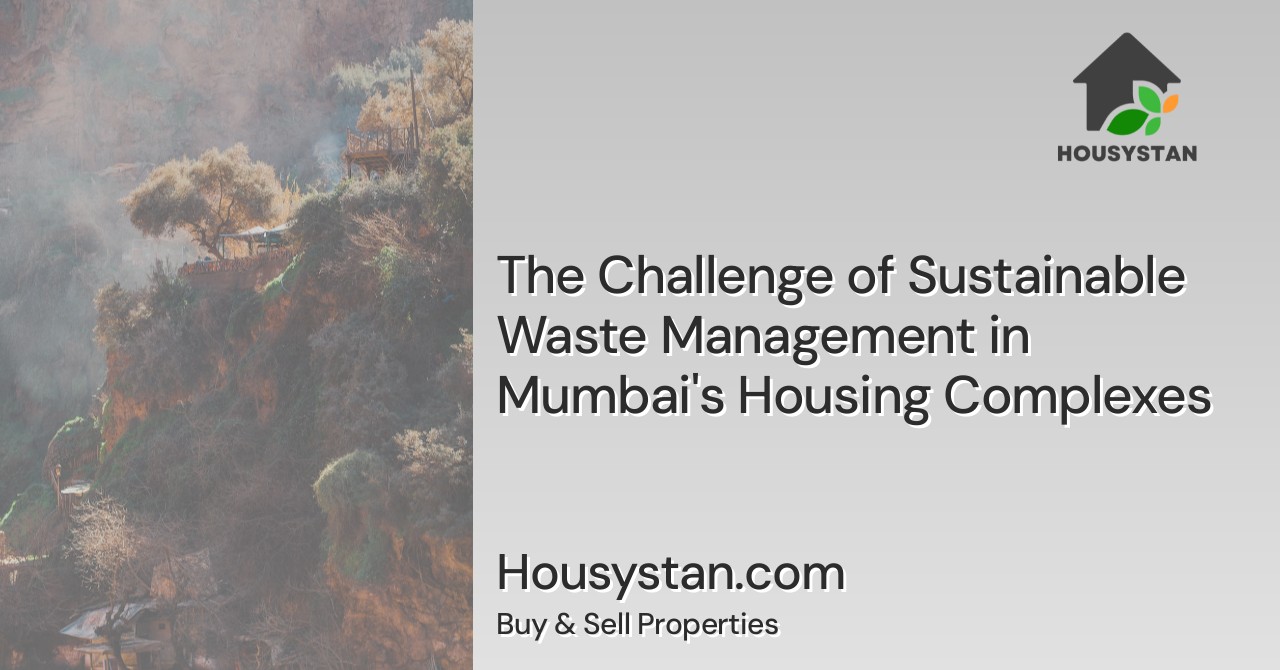The Challenge of Sustainable Waste Management in Mumbai's Housing Complexes
Read latest blogs and articles from Housystan

The Information mentioned here was last updated on:
25/1/2026The Challenge of Sustainable Waste Management in Mumbai's Housing Complexes
Mumbai, a thriving metropolis, is home to thousands of housing complexes. While these complexes provide much-needed accommodation to the city's burgeoning population, they also contribute significantly to one of Mumbai’s most pressing issues: waste management. As the city continues to grow, finding sustainable solutions for waste management in these residential areas is crucial. This blog post explores the challenge of sustainable waste management in Mumbai's housing complexes and potential ways to address this issue.
Understanding the Waste Problem in Mumbai
- Verified Tenants/Buyers
- Unlimited Property Listing
- Zero subscription/charges fee
Mumbai, with its dense population, produces an astounding amount of waste daily. Currently, the city generates approximately 10,000 metric tons of waste each day. The bulk of this waste comes from residential areas, including the numerous housing complexes scattered throughout the city.
Key Challenges in Waste Management
1. Volume and Density: The sheer volume of waste and the high population density pose a significant challenge to efficient waste management in Mumbai.
2. Limited Landfill Space: The city struggles with limited landfill space, making it increasingly difficult to dispose of waste in an environmentally friendly manner.
3. Segregation at Source: While Mumbai has introduced waste segregation policies, the implementation and adherence across housing complexes remain inconsistent.
4. Lack of Awareness: Many residents are still unaware of how to properly segregate waste or the importance of doing so, which leads to mixed waste collection.
Sustainable Waste Management Practices
To address these challenges, it's essential for housing complexes to adopt sustainable waste management practices. Doing so not only helps the environment but also enhances community living conditions.
Waste Segregation
Segregating waste at the source is one of the most effective ways to manage waste sustainably:
- Organic Waste: Includes kitchen scraps and other biodegradable materials that can be composted.
- Recyclable Waste: Materials like plastics, paper, and metals that can be sent to recycling facilities.
- Non-Recyclable Waste: Items that cannot be reused or recycled should be minimized.
Housing complexes can initiate awareness programs and workshops to educate residents on proper waste segregation practices.
Composting
Organic waste composting is an excellent method to reduce the amount of waste sent to landfills:
- Community Composting: Housing complexes can set up common composting units that residents can access.
- Private Composting Solutions: Individuals can adopt in-home composting solutions using compost bins or vermiculture.
Recycling Initiatives
Setting up recycling programs within housing complexes can help reduce the burden on Mumbai's waste management system:
- Collection Drives: Regular collection drives for paper, plastic, and electronic waste can encourage recycling.
- Partnerships with Recycling Companies: Housing societies can partner with local recycling companies to facilitate proper waste processing.
Involvement of Local Authorities
The involvement of local authorities is critical in supporting housing complexes to manage waste sustainably. Government initiatives and collaborations can lead to improved waste management infrastructure and support:
- Policy Enforcement: Ensuring that housing complexes adhere to waste segregation rules through regular inspections and penalties for non-compliance.
- Infrastructure Development: Investing in better waste collection and processing infrastructure to handle segregated waste efficiently.
- Incentives and Support: Providing incentives for housing complexes that effectively manage their waste and create awareness programs can encourage more complexes to follow suit.
Technologies and Innovations
Emerging technologies and innovative solutions can significantly impact sustainable waste management practices:
- Smart Bins: Implementation of smart bins that use sensors to indicate fill levels and send alerts for pickup can optimize waste collection schedules.
- Waste-to-Energy Solutions: Converting waste into energy through biogas plants or incinerators can reduce landfill dependency and provide energy for local use.
- Data Analytics: Using data analytics to predict waste generation patterns and optimize collection routes and processing methods.
Role of Residents and Communities
The collective effort of residents is pivotal in achieving effective waste management:
- Resident Associations: Active resident associations can organize workshops, promote awareness, and ensure compliance within the housing complex.
- Volunteering and Participation: Encouraging community participation in segregating and recycling initiatives strengthens community ties and promotes sustainable living.
- Feedback Mechanisms: Establishing channels for residents to provide feedback on the existing waste management practices ensures continuous improvement.
Educating Future Generations
Ensuring that future generations understand and value waste management is vital for long-term sustainability:
- School Programs: Schools within housing complexes or nearby can include waste management education in their curriculum.
- Family Participation Events: Organizing family-oriented events focused on sustainability can instill the importance of waste management in children.
Global Practices and Adaptation
While addressing Mumbai's unique challenges, looking at successful global practices can offer valuable insights:
- Zero-Waste Models: Cities like San Francisco have achieved impressive waste diversion rates with zero-waste policies.
- Pay-As-You-Throw: This model charges residents based on the amount of non-recyclable waste they produce, incentivizing waste reduction.
Adapting these practices to fit Mumbai's context can lead to improved waste management systems in housing complexes.
Note: The above information contains factual strategies and initiatives that can be executed to tackle waste management issues effectively. For additional resources, refer to local waste management websites or governmental guidelines on sustainable practices.